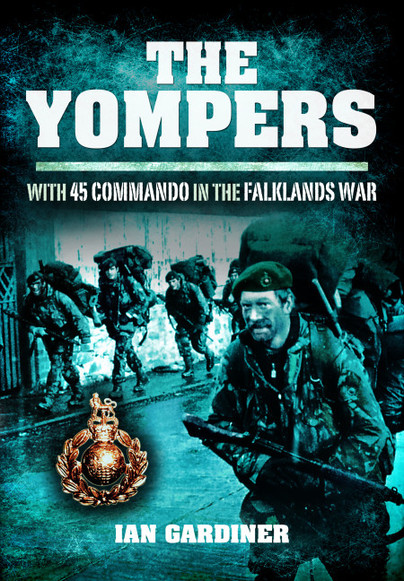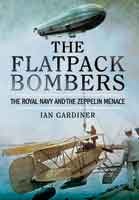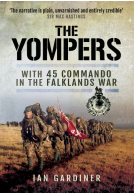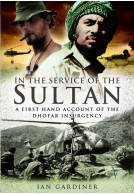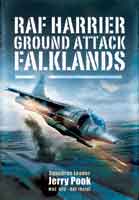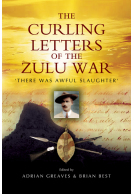The Yompers (Hardback)
With 45 Commando in the Falklands War
Imprint: Pen & Sword Military
Pages: 224
Illustrations: 50 black and white illustrations
ISBN: 9781848844414
Published: 2nd February 2012
Last Released: 21st January 2025
Star review
"One of the finest accounts by a front line officer ever written."
~ Professor Eric Grove. Via The Phoenix Think Tank article The Falklands – Lessons Learned
(click here for international delivery rates)
Order within the next 2 hours, 39 minutes to get your order processed the next working day!
Need a currency converter? Check XE.com for live rates
| Other formats available | Price |
|---|---|
| The Yompers Paperback Add to Basket | £10.49 |
| The Yompers ePub (5.6 MB) Add to Basket | £6.99 |
'Yomping' was revealed by the journalist Charles Laurence in 1982 as the word which the Royal Marines used to describe carrying heavy loads long distances on foot. Given the intense public interest in the dramatic events then unfolding in the South Atlantic, it caught on and is now in common usage. The Yompers is the first account to be written by a company commander who fought in the Falklands War. Called to action from their beds early on 2 April 1982, the author along with the rest of 45 Commando Royal Marines, sailed 8,000 miles to play a key role in the recovery of the Falkland Islands from Argentine occupation. Lacking helicopters and short of food, they 'yomped' in appalling weather carrying overloaded rucksacks, across ground which threatened to break legs and ankles at every step. Despite extreme hardship, their morale and training ensured they remained a cohesive fighting-fit body of men. They went on to fight the crucial night battle for Two Sisters, the twin 1,000 foot high peaks which were keys to the defensive positions around Stanley.
The author paints an illuminating picture of the Royal Marines Commandos at war. Gritty and moving, and at moments wryly amusing, The Yompers provides penetrating, original first-hand insights into wider aspects of the Falklands War as well as conflict in general.
As featured in
Edinburgh Evening News
As featured in: 'No one every decides to ring you up at 5am with good news'
The Scotsman
In my opinion one of the best books on this war, a book that cannot be missing in the library of a fan of this war, so modern but at the same time ancient.
On The Old Barbed Wire
Read the full Italian review here
Post publicity for author's 30th Oct event at Probus Club
Linlithgow Gazette, 1st November 2019
Such a good tribute to the bravery of the marines during the Falklands War.
Amazon Customer, Richard Domoney-Saunders
It is well written and puts the reader right at the heart of the war from these mens perspective.
Buy this if you want an honest account of what one unit goes through in a time of war.
As featured in
Pathfinder International, August 2017
The Falklands Task Force carried the Marine Commando, the Parachute Regiment, the SBS and the SAS 8,000 miles, together with other British Army units to give the Argentine bandits a thorough thrashing. This is a fabulous, moving, entertaining, thoughtful, emotional read and reminder that other countries still under estimate Great Britain to their cost. – Most Highly Recommended.
Firetrench
Read the complete review here.
"This is one of the finest accounts by a front line officer ever written."
Prof. Eric Grove, The Phoenix Think Tank
As featured in footnote 5 of article: The Falklands – Lessons Learned
As featured in.
The Telegraph
Gardner's narrative and reflections are clear, exciting, extensive and valuable.
Navy Today (New Zealand)
A cerebral Scot who retired as a brigadier, the author is as brilliant at explaining the strategic complexities of the campaign as he is at allowing the reader to experience what it really felt like to be invloved in an unending battle with the elements and against an enemy whose will needed to be broken if the war was to be won. He is generous in his praise of other units, where praise is due, but never shirks from criticism where it is needed. This book maintains the extremely high standards of detail, interest and readability that the author achieved in his first two books.
Guards Magazine
Ian paints an illuminating picture of RN Commandos at war and provides penetrating first-hand insights into wider aspects of the Falklands War and conflict in general.
Association of Royal Navy Officers Yearbook
The Yompers should be required reading in every service institute. Put simply, it is a masterpiece of narrative on the challenges as well as the risks of the profession of arms and the best yet to emerge from the Falklands War of thirty years ago.
RUSI Journal
This book is compelling, witty and and enjoyable.
Royal Marines Museum Website
Ian Gardiner provides a vivid insight into the conflict and not just into strategy, tactics and the actual fighting. What are most revealing are the human touches – the small things that made life miserable or bearable. In his book Ian Gardiner paints a fascinating picture of the Royal Marines at a pivitol point in their history. This is an excellently written volume which I strongly recommend.
Warship World
This wise, beautifully written book has many excellent photographs. Highly recommended.
The Naval Review
An illuminating picture of the Royal Marines in action. Gritty and moving and at moments wryly amusing. Gives a penetrating insight into wider aspects of the war as well as armed conflict in general.
Pennant
Both revealing and pacey, The Yompers is a well told tribute.
Scottish Legion News
Ian, whose book book The Yompers was published in February, will describe the little known but highly successful action.
The Journal (Newcastle)
The Yompers: With 45 Commando in the Falklands War by Ian Gardiner is another keeper, in spades. His discussion of command in combat is so good that I wish I could quote it in full.
Literary Review
It's an extraordinary journey, which Gardiner describes so brilliantly you feel as if you are part of the exhausting experience, sharing the pain and discomfort. It's a tale of endurance that ends in a raw fight to the death in a harsh environment. As such it's an account that shows how tough and professional those who wear the hard-won green beret really are. Their performance was outstanding, and so is TheYompers.
Warships Magazine
This new book, by retired Brigadier RM, Ian Gardiner, marks the thirtieth anniversary of the Falkland war. It provides the best account of the Battle for Two Sisters I have read anywhere. The details of the night action and the determination and skill at the arms of the young marines under his command, fighting their way up into enemy trenches with "butt, boot and bayonet"' are vividly described. The late Professor Richard Holmes, the doyen of Modern military historians, wrote of Ian Gardiner previous book, In the Service of the Sultan, his account of his service in the Dhofar Campain, that it was 'one of the best books about soldiering I have ever read. Its all about making the most of what you have, rather than dwelling on what you lack. It is highly recommended to all who care to learn from experience but listening to the voice of one who was at the sharp end and has reflected throughout his military career on what his experiences meant, then and now, personally and professionally.
Desmond Woods, Headmark Magazine
When the Argentinians invaded the Falkland Islands 30 Years ago this month, Ian Gardiner was a newly married Royal Marines captain, age 32, and commander of one of the three rifle companies in 45 Commando. Here is an adaptation of his new book The Yompers, he recalls some vivid moments from the grinding, heroic weeks of battle that ensued.
Saga Magazine
The Yompers is a good, very amusing, first-hand account of the practical difficulties the Commandos had to endure, and overcome, in their arduous campaign in the Falklands. Book of the month.
Britain at War
Ian Gardiner has produced an excellent account of the service of 45 Royal Marine Command during the Falklands War. His vivid account covers all aspects of this short brutal little war. His account is articulate, poignant and precise, even though 30 years have now elapsed since the events he describes. This book comes with excellent black and white photographs. It is highly recommended to anyone with an interest in Britain's last successful war.
Military History Monthly
Absolutely authentic, magnificent Marines!
Martin Middlebrook
This book is quite a bit more serious than its populist title would indicate. Ian Gardiner left the Royal Marines in 2001 in the rank of brigadier; his first book, In the Service of the Sultan: A First Hand Account of the Dhofar Insurgency was described by the late Professor Richard Holmes as ‘one of the best books about soldiering I have ever read’.
Admiral Guy Liardet
Amidst the numerous books about the Falklands conflict, this is the first from a company commander – in this case X Ray Company, 45 Commando, Royal Marines. As ‘man of the match’ Major-General Julian Thompson says in his foreword, ‘a rifle company is the sharp end of the spear thrust into the antagonist’s flesh……..surprisingly few men actually close with and kill the enemy; the spearhead is small compared with the haft’. Thompson notes that in just under four weeks, his Brigade had 90 killed and 186 wounded, with another 132 non-battle injuries from cold, wet and broken bones.
Gardiner opens with the remarks; ‘A soldier knows he can’t choose his enemies. His enemies are the Queen’s enemies and so he gets on with it because he is with his friends….. a soldier will endure to death itself in order to retain the good opinion of his fellows’. In an aphorism-rich introduction, he analyses the causes of the war: ‘So the British were fighting for their credibility, the Argentines for their pride’. ‘If fighting for the self-determination of peoples is futile, then this was a futile war, but we who fought did not think it so’.
He covers the contemporary position of the Royal Marines – perennially under threat of extinction – and the circumstances that allowed the British to deploy successfully an amphibious capability that their Naval Headquarters had no experience in deploying and was overdue for the Government scrap heap while, despite the experience of many operations and exercises, using unsuitable command and control arrangements which led to misunderstandings that compounded the normal friction of war.
Clauswitz’s friction obtained all the way from UK to the Falklands, despite the opportunity to re-pack everything at Ascension –‘the unsung masterpiece of the operation’. Gardiner’s account of the preparations, training and the eventual assault landing is gripping and his judgements about the surrounding events – South Georgia, the Belgrano – are extremely well-informed and balanced. Of course, the landing plan went awry from the start, but one of Gardiner’s themes frequently projected to his people is that this is what happens to plans in war. He has some pretty direct remarks to make about the composition and battle-worthiness of 5 Infantry Brigade, comparing the ‘years of expensive, assiduous, rigorous preparation to make 3 Commando Brigade ready for this sort of operation’. ‘Not so for 5 Infantry Brigade, and to pitch the men of this semi-trained, improvisatory, ill-supported, unready formation into an amphibious, high intensity conflict at no notice … was to ask a very great deal of all the people in it’. The bold but unilateral move forward, as a result of a telephone conversation, to Fitzroy and Bluff Cove by 2 Para in the Chinook is shown as unbalancing logistics and having all sorts of unfortunate consequences, including Sir Galahad.
My God, those marines must have been tough! Here I must telescope the account of how the loss of the Atlantic Conveyor forced 45 Commando to walk over rocky or soggy terrain from Port San Carlos to Douglas Settlement to Teal Settlement to Bluff Cove Peak and finally to their attack objective, Two Sisters, while carrying an astonishing weight in their packs, decorated here and there with radio kit, Milan anti-tank bunker busters and associated missiles, light and heavy machine guns – and ammunition. On the map it looks like 60 miles, but on the ground probably further.
The sheer complexity of infantry operations comes as a surprise to this writer – Gardiner in no way blows his own trumpet but is proud of the fact that as a result of his leadership, his company took their Sisters peak against a determined defence without a fatal casualty and this was clearly the result of the most careful planning, briefing and rehearsal for exhausted men, taking into account the terrain, naval gunfire support, likely Argentine defences, what to do if things went wrong and a host of other factors.
‘All wars are started and finished by politicians. This one was no different, and it was started by gross British political failure, a failure of deterrence’.
This wise, beautifully written book has many excellent photographs. Highly recommended.
You don’t have to be a military man to enjoy Ian Gardiner’s The Yompers, the first memoir of the Falklands War to be written from behind the gun sights by a career Royal Marine. There is plenty of unique material for the arm chair generals and military historians who relish the details of how a battle can turn on the setting of a bomb fuse or the structure of a combat boot, that last being of particular concern to a yomper. But it is something extra that makes Gardiner not just a retired brigadier with a story to tell, but a writer.
Charles Laurence, correspondent for The Daily Telegraph in 1982, attached to 45 Commando, East Falkland
“Yomping, they call it in the Royal Marine Commandos…it means marching, humping up to 120 lbs of equipment,” I wrote as an “embedded” reporter for the Daily Telegraph on a borrowed typewriter in the manager’s office at Douglas Settlement, midway through the great yomp. The story reached the London press on June 3rd, thirty long years ago, and introduced the world to both commando slang that has never ceased to reverberate, and a glimpse of the extraordinary qualities of men who included one Captain Ian Gardiner, CO of X Ray Company, 45 Commando.
Gardiner brings to life those men and their war as never before. Who knew that the commando went into battle to the sounds of the movie The Blues Brothers? Gardiner begins his story in the messes of the cramped troop ship as officers and men watch the classic rebel comedy over and over again. Jake and Elwood, Ray Charles and Aretha Franklin take over from Tipperary or anything from Elgar as the warriors’ theme song, and Gardiner gives us an understanding of his troops far, far from the routine clichés of the fighting man.
Then came the yomp and, as Gardiner writes: “This was where the fun stopped.” The yomp was an anachronism in the age of helicopters and mechanised infantry, but Britain’s success depended on the ability of young men to make up for the lack of “assets” which should have been brought to the battlefield. Heart warming stuff. But the yomp and the fight at the end of it was a hellish experience, and Gardiner’s vivid, honest descriptions do justice at last to those who suffered it.
Gardiner is enough of an officer to make clear that every word of The Yompers is dedicated to honouring his comrades and their families. But he is also enough of a writer to create a vivid, unflinching portrait that does them true justice.
Ian Gardiner is a raconteur and one of the finest story tellers of military history. Few other authors can match Gardiner’s narrative and his range of language. I suspect that even the most well educated reader will be scurrying for the dictionary at some stage.
Peter Weedon
Gardiner tells the story of 45 Commando during the Falklands War, “the point of the spear” as Julian Thompson states in the foreword. 45’s journey from Arbroath to the South Atlantic in described in great detail; the confusion of being summoned to war from the comfort of your own bed, the organized chaos of the logistics operation for the 8,000 mile trip down south and on to war and the aftermath.
What sets the book apart is Gardiner’s ability to combine a broad strategic overview with the reality of life in the trenches. Gardiner walked, smoked, dug, slept and fought with his men. He endured the hardships they did with the added burden of having men’s lives in his hands.
In the context of the campaign 45 Commando’s casualties were mercifully light, thanks to the constant planning and probing. Gardiner lost none of his men and to bring them all home “was a privilege and a joy which has abided with me all my life, and barely a day passes without a humble, grateful thought.”
Gardiner reflects on the honours and awards, and makes a few observations on 5 Infantry Brigade
There will be more comprehensive books on the Falklands, but for elegance and humanity “The Yompers” has no equals.







